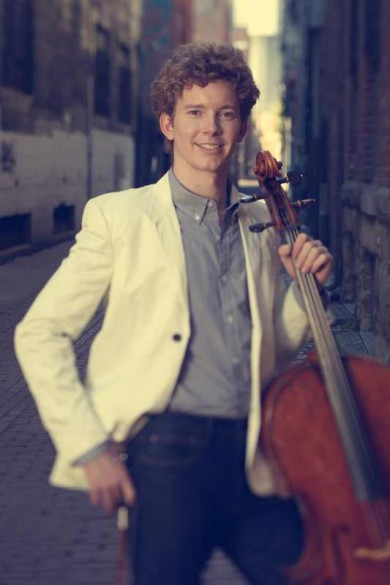Cellist Roman brings Classical elegance and taste to Gusman program
Joshua Roman presents a strikingly conventional appearance for a musician known for performing in nightclubs, championing new works and publicizing himself on YouTube.
The young cellist walked on stage Sunday at the University of Miami’s Gusman Hall in a dark business suit and gray tie, with a gold wedding band on his bow hand, his appearance distinguished only by a huge mop of reddish blond hair. And there was nothing unusual on the program of works by Russian and German masters that he was to play for the opening concert of the Sunday Afternoons of Music series.
Yet there was a clean, contemporary feeling to the 29-year-old’s playing that set him apart from many of the string players of a generation ago, from the singing but unsentimental tone he brought to lyric passages to the crisp, efficient manner with which he handled the most rapid strings of notes.
He opened with Stravinsky’s Suite Italienne, the composer’s arrangement for cello and piano of music from his ballet Pulcinella. In keeping with the work’s modest, Neoclassical proportions, Roman kept the performance light, playing with agility and a touch of humor in the opening movement.
In the songlike Serenata he deployed his vibrato with care, using it to enhance long-held notes rather than spreading it thick on every phrase, giving the section an almost period-performance feel that sounded at once very old and very modern.
In the Minuetto e Finale, Roman cut loose, using a grand and sonorous style of bowing and attacking broken chords in a manner that was full of bite and resonance, yet without the crunching and bow-clicks that attend the playing of some cellists.
Prokofiev’s Cello Sonata in C Major seems to make a point of letting the cello be a cello, with the piano ceding the bass clef and spending most of its time in the upper register.
The sonata opens in the throaty depths of the cello’s range, and Roman drew a tone of great richness and dark power from the instrument in Prokofiev’s long melodic lines. Technically it’s a difficult work, but Roman handled all the hurdles in an unruffled manner, bringing knife-like clarity and accuracy to the high-speed arpeggios that come toward the end.
The Prokofiev sonata’s playful second movement came off as more subdued than it should. Even though Roman broke some bow hair, generally a sign of effort in a string player, the performance felt underpowered.
But the final movement was full of verve and momentum. He zipped through quick passages with apparent ease, including many requiring him to play two notes at once. In the long melody toward the end, Roman showed—as he would throughout the concert—that he could draw singing tones from the cello through skilful bowing, phrasing and just the right amount of vibrato, playing with a cool lyricism that suited Prokofiev.
Pianist Cory Smythe was much more than an accompanist throughout the recital. Smythe deftly handled the difficult part devised by Prokofiev, himself a virtuoso pianist, playing with a smooth, assured touch at the keyboard. Each time the lonely wisp of a second theme returned in the piano, it sounded different.
Schumann’s Fünf Stücke im Volkston (Five Pieces in Folk Style) presents a series of earthy melodies for cello. In these, the most distinguished performances came in the melodic second movement and the exuberant last section, performed with a light and energetic touch.
Beethoven’s Cello Sonata No. 4 comes from the composer’s late period, and sounds it, with moments of repose broken by sudden bursts of complex, hard-driving passages, abrupt halts and pages of striking serenity.
Roman and Smythe gave the quiet opening Andante a tone of tense expectation, and then burst into the stormy Allegro. Roman played in a clipped style that suited Beethoven’s gruff phrases. He brought a lofty, prayerful tone to the Adagio. The concluding Allegro vivace was a rollicking affair that brought the concert to a forceful close.
As an encore, Roman offered Saint-Saëns’ The Swan, a famous melody that he performed with chaste restraint, allowing the tune to speak for itself.
Posted in Performances
Leave a Comment
Mon Sep 9, 2013
at 12:17 pm
No Comments
